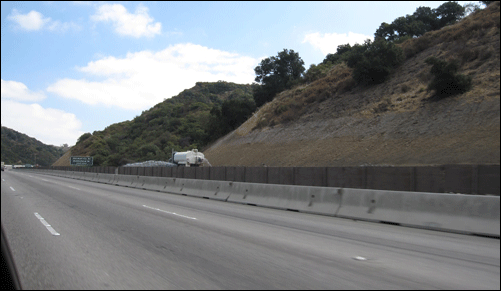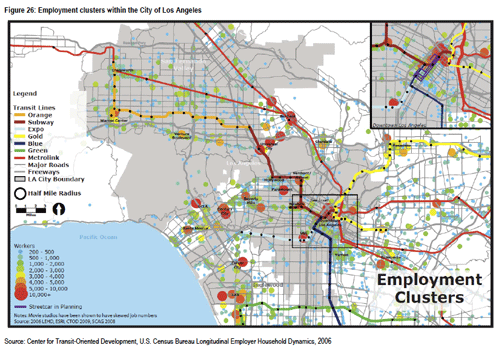Carmageddon failed to live up to the hype, as Los Angelenos opted to leave their cars in the garage. As the hysteria fades, Planetizen's Tim Halbur asks: is there a real story here about good transportation planning?
By now, it's all over the news – like the Rapture predicted by Harold Camping back on May 21st, Carmageddon failed to bring Los Angeles to a perilous state of near-collapse. With all the hysteria, Los Angelenos got the message and stayed home – presumably to watch the new Harry Potter film, which broke box office records over the weekend.
Freeways, and even local roads like Laurel Canyon, which was expected to come to a standstill as people looked for alternatives to the 405, experienced less congestion than usual. L.A. County Supervisor Zev Yaroslavsky, apparently the man behind the catch prhase "Carmageddon", reported to Reuters that two-thirds of the drivers that normally use the 405on the weekends stayed home.

Even Friday afternoon, when you would expect people to be getting off of work and winding their way home, traffic was unexpectedly light. Beth Oliver, a resident of Los Angeles since the 1970s, said, "We were cruising down the 101 with absolutely no traffic. I have never seen the freeway so empty on a Friday." Some of this could be explained by businesses allowing their employees to leave early, as many major Hollywood studios like Paramount did. The Getty Museum, perched above a closed section of the 405, opted to close altogether for a long weekend.
Of course, businesses that rely on travelers from all over the region felt a pinch. In a video made by USC students, Shana Dysert of The Lazy Ox Canteen in downtown L.A. explained that the restaurant had only attracted half the diners that they would on a normal weekend. "You could definitely tell people were afraid to come out because of Carmageddon," said Dysert. "We don't have as many people coming from the Westside. We normally get a lot of people from the Westside, the Valley and the O.C."
But on the other side of the economic perspective, Carmageddon can be celebrated as a job creator. As Bill Boyarsky at L.A. Observed noted, the entire 405 widening project has employed 18,000 people. That's your stimulus dollars at work.

Perhaps the greatest lesson to derive from the hysteria over the 405 closing is that Los Angeles, and the San Fernando Valley in particular, is far too reliant on one transportation mode to reach L.A. proper. During the workweek, when locals wouldn't have the choice to stay home or not, a 405 closure could have had dramatic consequences. As the image above (created by the Center for Transit-Oriented Development (CTOD) to show options for TOD in the region) shows, the Valley (in the Northeast of this graphic) lacks major job centers and employers, so residents inevitably must snake their way south to get to work. With the Hollywood Hills in the way, the 405 is one of few options.
And even a major media blitz can't change commute patterns on a long-term basis.
UPDATE: The numbers are in- transit ridership was up on certain Metro lines (Orange, Red and Green), but the general consensus is that people decided to stay home rather than seek alternatives.
Tim Halbur is managing editor of Planetizen.

Planetizen Federal Action Tracker
A weekly monitor of how Trump’s orders and actions are impacting planners and planning in America.

Chicago’s Ghost Rails
Just beneath the surface of the modern city lie the remnants of its expansive early 20th-century streetcar system.

Amtrak Cutting Jobs, Funding to High-Speed Rail
The agency plans to cut 10 percent of its workforce and has confirmed it will not fund new high-speed rail projects.

Ohio Forces Data Centers to Prepay for Power
Utilities are calling on states to hold data center operators responsible for new energy demands to prevent leaving consumers on the hook for their bills.

MARTA CEO Steps Down Amid Citizenship Concerns
MARTA’s board announced Thursday that its chief, who is from Canada, is resigning due to questions about his immigration status.

Silicon Valley ‘Bike Superhighway’ Awarded $14M State Grant
A Caltrans grant brings the 10-mile Central Bikeway project connecting Santa Clara and East San Jose closer to fruition.
Urban Design for Planners 1: Software Tools
This six-course series explores essential urban design concepts using open source software and equips planners with the tools they need to participate fully in the urban design process.
Planning for Universal Design
Learn the tools for implementing Universal Design in planning regulations.
Caltrans
City of Fort Worth
Mpact (founded as Rail~Volution)
City of Camden Redevelopment Agency
City of Astoria
City of Portland
City of Laramie





























